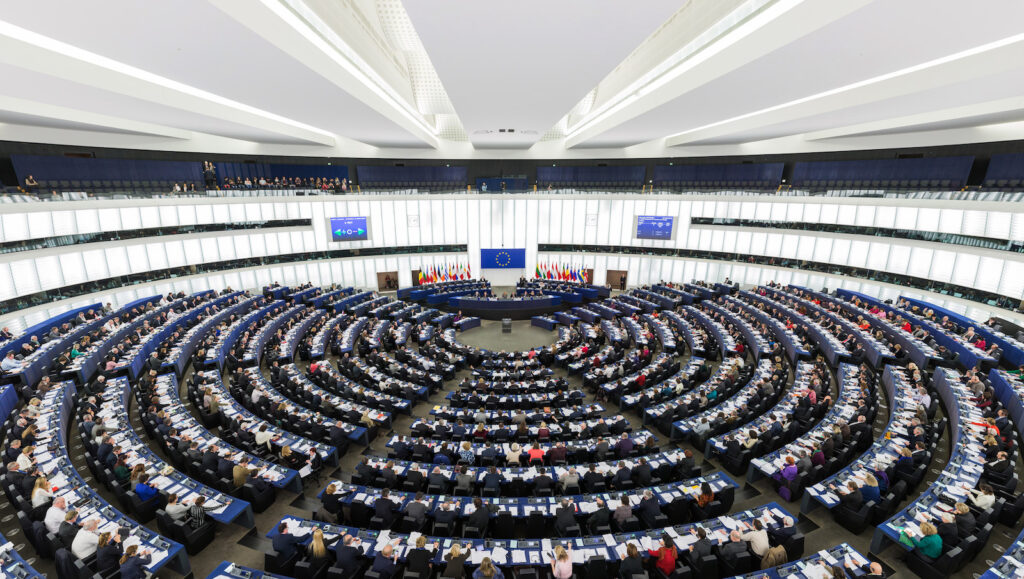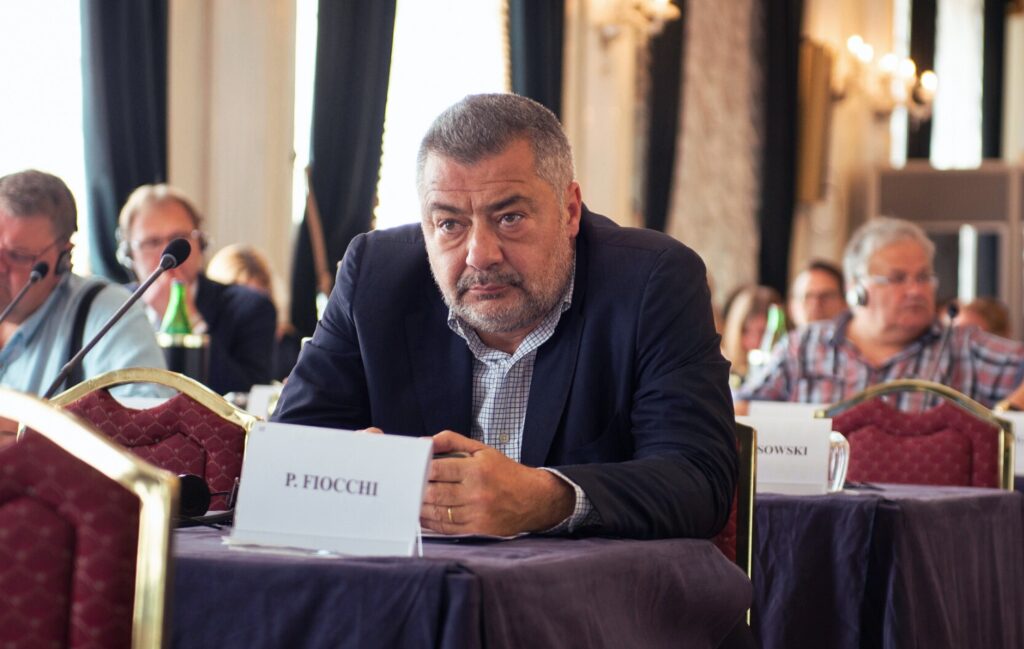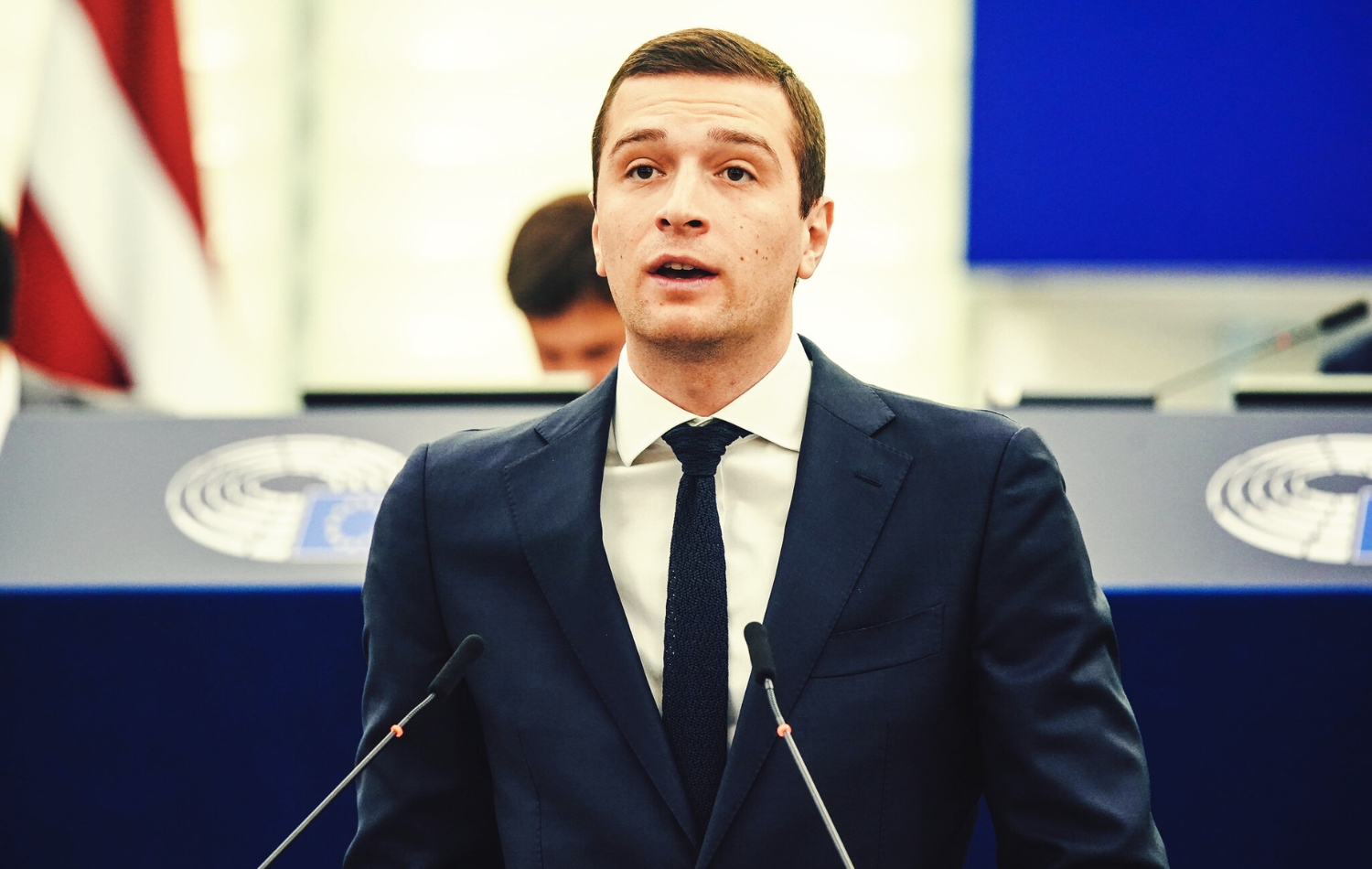The far-right Patriots for Europe (PfE), currently the third-largest group in the European Parliament, achieved a major victory in July. The group will lead negotiations on the EU’s 2040 climate target – a powerful role that will allow it to draft the Parliament’s position on the EU’s climate policies.
This appointment signals a turning point. After years on the political fringes, the far-right now holds tangible influence over the EU’s climate agenda, and plans to use this newfound power to “call for a genuine overhaul of EU climate policy,” the group declared on X.
For decades, the EU Commission – the bloc’s principal decision-making body – has benefitted from a majority in the Parliament formed largely by the centre-right European People’s Party (EPP) group, the centre-left Socialist and Democrats, and the liberal Renew.
But the farmers’ protests in 2023 and 2024 shook European politics. Farmers took to the streets of Brussels, Berlin, Paris, Prague, and Rome to express anger at their treatment by the political establishment. Far-right and right-wing groups tried to create their own narratives and exert influence, describing the protests as a revolt against EU climate policies, although many farmers were also protesting about high production costs, food pricing, and trade concerns.
This earthquake gave way to a landslide during the European elections in June 2024. Compared with the previous term, the EPP obtained more power, the Greens dramatically lost ground, and parties on the far-right achieved a new role at the heart of European politics.
With 187 seats out of 720 in the Parliament, hard-right and far-right groups now have an unprecedented opportunity to influence European politics.
A guide to European Parliament’s right-wing and far-right groups
European People’s Party (EPP): 188 seats
Key national parties: CDU/CSU (Germany), People’s Party (Spain), Civic Platform (Poland)
Patriots for Europe (PfE): 85 seats
Key national parties: National Rally (France), Fidesz (Hungary), Freedom Party of Austria
European Conservatives and Reformists (ECR): 79 seats
Key national parties: Brothers of Italy, Law and Justice (Poland), Vox (Spain)
Europe of Sovereign Nations (ESN): 27 seats
Key national parties: Alternative for Germany
“The EPP is under pressure from the far-right, which knows how to take initiatives to put it in an uncomfortable situation,” Philippe Lamberts, an advisor to European Commission President Ursula Von der Leyen and a former Green Member of European Parliament (MEP), told DeSmog.
This discomfort became apparent in November, when the European Parliament voted to postpone the Deforestation Regulation, a series of new rules that impose due diligence obligations on all businesses importing raw materials into Europe.
For the first time, a major environmental decision was passed with the support of right-wing groups, while the original coalition that had defended Europe’s climate policies – the so-called ‘Green Deal’ – fell apart.
This has been a pattern of the last year – the far-right uniting with Europe’s more moderate conservative groups in an attempt to kibosh climate legislation.
In April, they aligned to postpone the dates for the implementation of two flagship laws on corporate sustainability reporting and due diligence requirements. Then, in June, they mounted a campaign accusing the EU of funding progressive, environmental civil society organisations.
The question is, how has this been achieved? Why is the far-right’s anti-climate narrative finally gaining a foothold in Europe? And has its language shifted in recent years?
Subscribe to our newsletter
Stay up to date with DeSmog news and alerts
From Denial to Delay
Arno Bausemer, an MEP in the Europe of Sovereign Nations (ESN) group, told DeSmog: “I see the description of me as a delayer of the ecological transformation as recognition of my political work here in the European Parliament to date.”
Bausemer’s pride in being a climate “delayer” is a reflection of the prevailing discourse among far-right groups in the Parliament.
According to a group of researchers led by William Lamb, a climate scientist at the Potsdam Institute for Climate Impact Research (PIK), we are witnessing a move from classical climate science denial to “discourses of climate delay”.
According to the researchers, “climate scepticism” is becoming more politically marginal. Instead, those who oppose the green transition now deploy narratives that accept “the existence of climate change, but justify inaction or inadequate efforts,” to address it, Lamb said.
“If someone points out that others are polluting more, that climate policies don’t work, or that these policies would harm society, they may be trying to discourage climate action – especially if they make no effort to find solutions to these problems,” he added.
In other words, the point is no longer to deny the existence of climate change, but to delay any political response to it.
A familiar strategy, for example, has been to focus on the high emissions of other countries – in particular China – as a way of justifying a rollback of climate measures in the EU.
“The European Union has reduced its greenhouse gas emissions by 33.9 percent since 1990. China has increased them by 300 percent since 1990. In a situation of global competition and with the resurgence of American power, we are constantly shooting ourselves in the foot,” said Gilles Pennelle, a National Rally MEP, during a parliamentary debate in January on the record heat suffered by Europe last year.

Bernhard Forchtner, an associate professor at the University of Leicester, believes that outright denial of climate science has not entirely disappeared from right-wing rhetoric, but that most parties have shifted towards obstruction and opposition to climate policies.
Together with Balša Lubarda, the two scholars analysed 792 contributions from far-right parties to European Parliament plenary debates from 2004 to 2019. They found that speeches accepting human-induced climate change increased from 44 to 56 percent, while scepticism plunged from 38 to 9 percent.
“If you focus on denialism, you are questioning only science and the fact that burning fossil fuels does no harm,” Forchtner said.
By contrast, disputing climate policies has allowed conservative parties to strengthen their entire narrative: their critiques of European institutions, international organisations, and prevailing economic ideas.
“They have always lamented the elites, the lack of common sense or loss of national sovereignty,” Forchtner added. “And now they can use these arguments almost interchangeably, talking about the climate, talking about COVID, talking about, at the moment, Ukraine.”
The position of Pietro Fiocchi, the Vice-Chair of the Committee on the Environment and Climate on behalf of the European Conservatives and Reformists (ECR) group, illustrates the attitude of right-wing parties on climate.
“The electric car is not the solution for the future of our planet. It’s destroying the economy and massacring jobs, but it’s not doing any good for the environment. The battery production system pollutes far more than the cars themselves,” Fiocchi posted on his social media accounts in January, commenting on a 27 percent drop in electric car sales in Germany.
According to a report by the environmental and consumer protection group Deutsche Umwelthilfe, various studies show that electric vehicles are more environmentally friendly overall than vehicles with combustion engines.
However, Fiocchi acknowledges the existence of climate change and staunchly refuses to be labelled as someone who wants to delay climate action, even despite objecting to certain green policies.
“I am a committed environmentalist, but I am also an engineer, and I want to see the numbers,” he told DeSmog.
Opponents of climate action also suggest that the EU’s climate policies carry an even greater burden for society than the consequences of a hotter planet.
Bausemer claimed in a debate about the European Investment Bank in May 2025 that “taxpayers’ money is being burned with full ideological force,” adding: “the Greens and their comrades are making energy expensive for millions of private households and driving thousands of companies to ruin.”
And, since last year’s European elections, they now have a platform to turn these narratives into policies.
A Marriage of Convenience
With 85 MEPs, the Patriots for Europe is today the third largest political group in the European Parliament.
National Rally from France, which is part of the PfE coalition, has the largest delegation of MEPs (29) in the Parliament. This gives it the power to “weigh in and influence the final vote”, said the group’s president, Jordan Bardella, at a press conference in Strasbourg in June.
Despite their strength in numbers, the more moderate EPP has treated PfE with some suspicion, maintaining a cordon sanitaire around the group.
But a mutual opposition to climate policy has broken through this barrier.
“The EPP may be more liberal than us, but we share the conviction that environmental issues shouldn’t be a constraint,” Mathilde Androuët, an MEP for the National Rally, told DeSmog. “In the corridors, some tell us: ‘We want to kill the Green Deal, but we don’t want to take the blame, so if you [the Patriots] could be the assassin, that would suit us!’”
However, the ECR has played the most significant role in tipping the balance of power in the European Parliament.
As the Parliament’s fourth largest political force with 78 MEPs, ECR’s relevance has been enhanced by the new diplomatic stature of Italian Prime Minister Giorgia Meloni, who has become an interlocutor with U.S. President Donald Trump. Her party, Fratelli d’Italia (Brothers of Italy), makes up the core of the ECR (24 members), which now presents itself as a kingmaker in the chamber.
According to EPP MEP Massimiliano Salini, the ECR was instrumental in delaying the implementation of the EU’s sustainability due diligence laws, which are intended to ensure that companies address environmental issues in their own operations and in their supply chains.
“A similar operation […] with the Conservatives and Renew was simply impossible in the past. Today, we can do it,” Salini told DeSmog.
Pietro Fiocchi is well aware of the new relevance achieved by his political group. “In the last term, we [the Brothers of Italy party] were only five out of 750. We counted for nothing,” he told DeSmog. “But we have evolved towards a more pragmatic approach to achieve some good results”.

Fiocchi and his colleagues have focused on the alleged effects of climate policy on “the economy, jobs, and even our health”, rather than disputing climate science – claiming that the “previous Commission had an ideological approach; they wanted to go green, whatever it takes”.
However, not everyone in the ECR shares Fiocchi’s pragmatism. Fellow Italian Sergio Berlato is still known for denying human-induced climate change.
“To claim that the main cause of climate change is attributable to human activities, and particularly to the CO2 emissions linked to these activities, is a theory lacking any scientific basis,” he said during a plenary debate in January.
But when it comes to outright denial of anthropogenic climate change, the ESN is “one of the beacons of denialism and obstructionism in EU politics,” Balša Lubarda said.
“A warmer climate has always been a blessing for humans,” stated ESN MEP Anja Arndt in a parliamentary debate on last year’s record heat. “Only technical inventions make it possible for us to survive in colder regions. Cold is the killer for humans, not heat, which is the issue today.”
The ESN, which was founded in 2024, is currently the smallest of the Parliament’s eight political groups with 26 members. Its largest party is the far-right German Alternative for Germany (AfD) with 15 MEPs.
Although it only makes up a fraction of the Parliament, the ESN presents itself as a strong, reliable partner in Europe’s anti-climate coalition.
“The slide to the right in Europe is good for the economy,” the group’s co-chair René Aust stated in a tweet on X in May. “In recent months, the EU Commission has either postponed, watered down, or completely scrapped several controversial ‘Green Deal’ regulations.”
These three groups have not managed to unite into a single force, for ideological as well as leadership reasons. But, for the first time, they can secure parliamentary majorities by supporting the right-wing EPP, which is the largest parliamentary group with 188 MEPs.
“When it comes to the climate, we can see their rhetoric coming closer together around the defence of competitiveness or the fight against standards,” said Pascal Canfin, an MEP for Renew and one of the main architects of the EU’s Green Deal.
According to Salini, however, the EPP is simply trying to adjust the EU’s climate agenda to the economic realities of Europe. “We don’t want to throw the baby out with the bathwater,” he said.
The Future of the Green Deal
The European Commission appears to be yielding to this pressure. In February, the Commission unveiled the so-called Omnibus package – a sweeping set of revisions to a range of environmental and climate laws – claiming that it wants to reduce bureaucratic burdens on businesses and citizens.
However, environmental NGOs have raised the alarm, warning that the reforms risk dismantling key environmental safeguards. As the European Environmental Bureau put it, “hard-won environmental and social protections are being quietly gutted.”
The right-wing bloc has already thrown its support behind the Commission. “In the coming weeks, we will be called upon to make an urgent and profound legislative effort to remove the duties we have imposed on ourselves with the Green Deal,” said ECR chairman Nicola Procaccini.
The extent to which the Omnibus package will dismantle the Green Deal depends on the EPP, which may be wary of assisting groups that are more vocally critical of European institutions.
“They are very well aware that – if they ally too strongly with not just the ECR but some of the parties on the far-right – they will be sowing their own destruction,” political scientist and far-right expert Catherine Fieschi told DeSmog, “moving in a direction that would actually strengthen deeply anti-European parties.”
Fieschi also believes that the alliance between the EPP and the far-right will stop short of striking a fatal blow to the Green Deal. “I don’t think anybody is going to come in like Trump and push back because European businesses have invested massively in certain technologies and what they need more than anything is predictability,” she said.
Ironically, in the pursuit of the economic growth preached by right-wing groups, it may become necessary for them to defend key elements of the Green Deal – especially as clean energy technologies like solar, wind, and batteries continue to plummet in cost, making them not only environmentally necessary but economically strategic. Whether this economic logic will prevail in time to avert catastrophic climate change remains an open question.
This publication is part of the cross-border investigation “From Denial to Delay: How the European Far-Right Adapts to the Climate Crisis” and was developed with the support of Journalismfund Europe.

Subscribe to our newsletter
Stay up to date with DeSmog news and alerts






